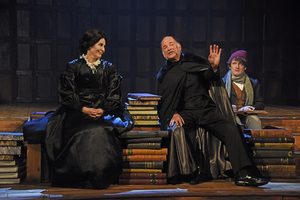Review: CHRISTMAS CAROL, Wilton's Music Hall

![]()
Charles Dickens's A Christmas Carol routinely places Ebenezer Scrooge centre-stage, shoving all its female characters to the side in an attempt to paint a deeply unfair and harrowing picture of London's Victorian society. The protagonist has been an immovable presence in theatres around Christmas time from the same year the novella was published, establishing Scrooge as a historically male role. That is, until now.
Writer Piers Torday decided to shake things and gently turn Dickens's story in a distinctively feminist tale of emancipation and female identity, putting Ebenezer's sister Fan at the centre of it. Stephanie Street brings it to Wilton's Music Hall, directing a play that never loses its grip on its storytelling nature and is as eerie as it is enchanting in its theatricals. In the original material, Fan dies young, a metaphor for Scrooge's kindness and love.
Torday's decision to swap the roles and turn her into the miserable miser that her brother usually is, means more than gender-bending a traditionally manly figure. He kicks off an entirely different reflection that stays from the customary transformation of the mean moneylender. Fan's heartlessness becomes a coping mechanism to withstand a strictly patriarchal system that has imposed its expectations and limits on a progressive and intelligent girl.
Survival evolves into cruelty when Fan is stripped of her name and purpose as she marries Jacob Marley. Sally Dexter excellently embodies this curt and sublimely sarcastic product of mid-1850s society. With Dexter, Scrooge grows into a woman who is confident in her choices and knows her worth, accepting the forces who've shaped her as part of her trajectory. In a world where men exert control on all aspects of a woman's life, Fan has been hardened by the circumstances in which she was forced to live.
While she obviously refuses to comply with her redemptive journey initially, the breakdown of her character diverges from the stereotypical bah-humbuggery associated with her male origins. Dexter is surrounded by a clever and precise company who take on a handful of characters each and transport Fan and the audience through space and time. Joseph Hardy and Chisara Agor go from being the humorously entertaining Ignorance and Want - who listen rapt to Meagre, Dickens's cat puppeteered by Yana Penrose and the narrator, but aren't afraid to interject with comments - to Tiny Tim and his mother, among others.
Agor is also the Ghost of Christmas Future, joining Ruth Ollman as Christmas Past and Edward Harrison as Christmas Present. Street's concept for the Ghosts is just another element in the magical essence of the production. She introduces the spectres as rooted to their source but with plenty of quirky facets to them, with the Ghost of Harrison's Christmas Present doubtlessly ending up being one of the highlights of the play. Tom Piper's set and Jo Lakin's puppetry are a strong component to the successful outcome of the piece, adding to the performative quality of the show.
The political side of Christmas Carol surfaces little by little in Torday's narrative, and the state of Victorian London appears alarmingly similar to the one of today. Cratchit (Harrison) gifts Scrooge with Frederich Engels's The Condition of the Working Class in England in the hopes that she realises how her exploitation impacts him, and she slowly starts to unveil her feminist agenda as she's given the chance to. By the end, the politics become slightly stretched, and there's a specific scene that briefly sticks out like a sore thumb style-wise, but undeniably do justice to the women in the story and are an exciting enhancement to the classic.
The ending is modern in its heartwarming wish, and refreshes Scrooge's redemption by giving an updated slant to the allegory. Christmas Carol is a curated show visually and thematically; it brings all the conventional Dickensian Christmas spirit to the Music Hall and peacefully celebrates the role of women in our society. This year, London is spoilt for choice when it comes to A Christmas Carol, but Torday's imaginative take and Street's vision definitely deserve a spot on the frontline.
Christmas Carol runs at Wilton's Musical Hall until 4 January.
Image courtesy of Nobby Clark
Add Your Comment
Videos
